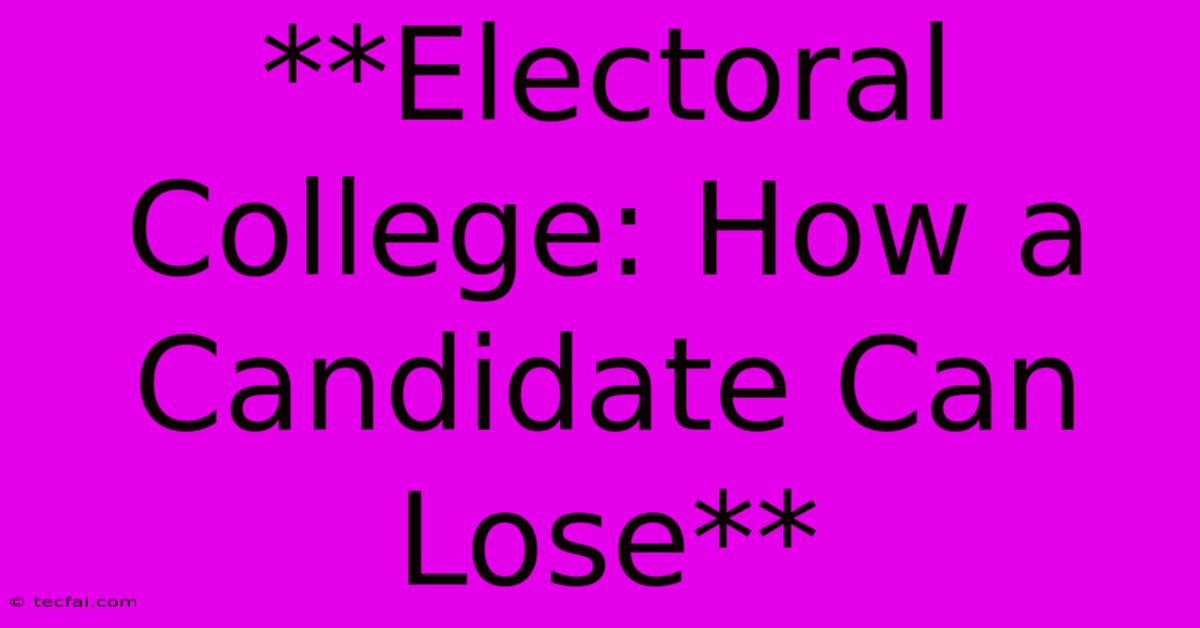**Electoral College: How A Candidate Can Lose**

Discover more detailed and exciting information on our website. Click the link below to start your adventure: Visit Best Website tecfai.com. Don't miss out!
Table of Contents
Electoral College: How a Candidate Can Lose Despite Winning the Popular Vote
The Electoral College, a unique feature of the U.S. presidential election system, often sparks debate, particularly when a candidate wins the popular vote but loses the presidency. This scenario, though seemingly counterintuitive, is entirely possible under the Electoral College system. Understanding how a candidate can lose despite winning the popular vote is crucial for comprehending the intricacies of the U.S. presidential election process.
The Electoral College: A Complex System
The Electoral College, established by the Founding Fathers, determines the winner of the presidential election. Each state is allotted a specific number of electors based on its population, with a total of 538 electors nationwide. To win the presidency, a candidate needs to secure at least 270 electoral votes.
How Winning the Popular Vote Doesn't Guarantee Victory
The popular vote, representing the total number of votes cast for each candidate across the country, does not directly translate to the presidency. Here's why:
- Winner-Take-All System: In most states, the candidate who receives the most votes within that state wins all of its electoral votes, regardless of the margin of victory. This "winner-take-all" system can lead to a candidate winning the presidency even with fewer popular votes.
- Uneven Electoral Vote Distribution: The number of electors per state is not directly proportional to its population, leading to a situation where some states have a disproportionate influence on the outcome. States with smaller populations often hold more electoral votes per capita, giving their votes more weight.
- Focus on Swing States: Candidates often focus their campaigns on a handful of "swing states" that are considered competitive and could potentially change the outcome of the election. This strategy can result in a candidate winning the popular vote but losing the election if they fail to secure enough electoral votes in these swing states.
Historical Examples of Popular Vote Losses
- 2016 Presidential Election: Hillary Clinton won the popular vote by nearly 3 million votes, but Donald Trump won the presidency by securing 304 electoral votes to Clinton's 227. This outcome highlighted the potential for a candidate to lose despite winning the popular vote, prompting renewed discussions about the Electoral College system.
- 2000 Presidential Election: Al Gore won the popular vote but lost the presidency to George W. Bush after a controversial Supreme Court decision regarding vote recounts in Florida. This election further emphasized the influence of individual states and the potential for close races to be decided by a small number of votes.
Arguments for and Against the Electoral College
The Electoral College has been a subject of intense debate for centuries.
Arguments for the Electoral College:
- Protects the interests of smaller states: The system ensures that candidates cannot ignore the concerns of less populous states, as they must compete for their electoral votes.
- Promotes a national focus: Candidates are incentivized to campaign across the entire country, not just heavily populated areas, leading to a more inclusive electoral process.
- Avoids potential for recounts in close races: The clear winner-take-all system minimizes the need for complex and potentially contested recounts.
Arguments against the Electoral College:
- Undermines the principle of one person, one vote: The system allows a candidate to win the presidency with fewer votes than their opponent, potentially diminishing the significance of individual votes.
- Leads to unfair representation: Some states hold more electoral power per capita than others, giving residents of those states an advantage in influencing the presidential election.
- Discourages voter turnout: The system can disincentivize voters in states that are considered safe for a particular party, as their vote may have less impact on the overall outcome.
Moving Forward: Reform or Abolition?
The debate surrounding the Electoral College continues to rage. While some argue for reform measures, others advocate for its outright abolition. Potential reform options include:
- National Popular Vote Interstate Compact: This proposed system would award all of a state's electoral votes to the candidate who wins the national popular vote, regardless of the state's individual results.
- Proportional Electoral Vote Allocation: Instead of a winner-take-all system, states could allocate their electoral votes based on the proportion of votes received by each candidate.
Whether the Electoral College remains in place or undergoes significant reform, it remains a pivotal aspect of the U.S. presidential election system. Understanding its intricacies and potential implications is crucial for navigating the complex landscape of American politics.

Thank you for visiting our website wich cover about **Electoral College: How A Candidate Can Lose**. We hope the information provided has been useful to you. Feel free to contact us if you have any questions or need further assistance. See you next time and dont miss to bookmark.
Featured Posts
-
Donald Trumps Family A Complete Guide
Nov 05, 2024
-
Camino De Santiago A Journey With Barrett
Nov 05, 2024
-
Scots Cyclist Hoys Cancer News
Nov 05, 2024
-
What We Learned Bucs Vs Chiefs On Mnf
Nov 05, 2024
-
Colts Game Goncalves First Defensive Innovations
Nov 05, 2024
